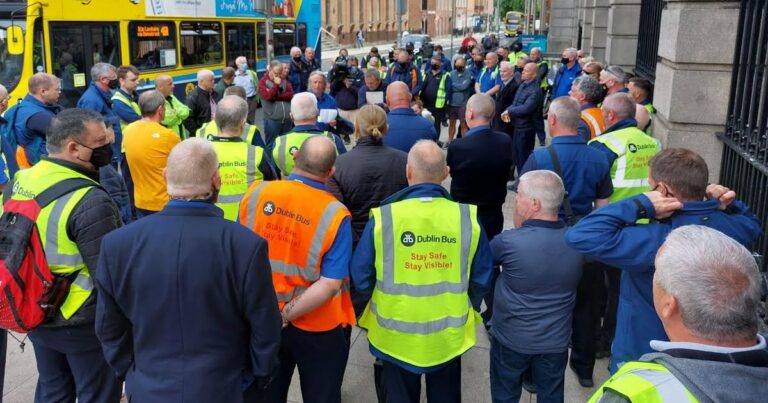In late July, over 100 Dublin Bus drivers gathered outside the Dail to speak with PBP TD Richard Boyd Barrett, and to vent their alarm at new proposals jointly agreed between their unions and the company. In the coming weeks they will vote on a proposal that would dramatically alter their working conditions.
At the heart of the dispute is the introduction of the BusConnects plan by the National Transport Agency (NTA). This plan is billed as dramatically improving the city’s bus network. Increased services, dedicated bus lanes, and a reworking of the entire route system are promised. Three years on, the often controversial new network started last month in the Clontarf garage. In reality the plan is far from revolutionary and most of the supposed increased services don’t seem to be delivered from any big increase in bus fleet numbers, but from greater flexibility around routing and drivers’ rosters.
Dublin bus fleet numbers remain below their number (1200) a decade ago and the BusConnects plan promises just 200 extra buses on today’s numbers overall by 2024; in reality that’s a drop in the ocean for what’s required given the climate crisis and importance of public transport.
Dublin Bus are using the new plan to push for a radical change in drivers’ existing conditions. In return for a largely self-financed pay rise from productivity over the next 4 years, drivers will lose fundamental conditions that have been fought and won over decades. The deal will mean much longer working times. Drivers will work every route in their garage and the system of a driver being marked in on a specific route will end. New rosters would see working days spread over 10 hours and much greater driving time behind the wheel.
Many drivers are enraged at the proposals, with union meetings hearing their anger at the new rosters impact on family life and work-life balance. Older drivers believe the rosters will make demands many will simply not be able to operate under. Others pointed out that one-person operated city bus driving is already an extremely stressful job with high rates of heart and other illnesses affecting workers over many years. The new proposals they believe will worsen those trends.
The main justification given by union officials for the new proposals and the loss of what is known as route identity is the threat by the NTA to existing Dublin Bus contracts to operate these new routes. Both SIPTU and NBRU officials voiced the belief that unless the new rostering practices were adopted the NTA would award the routes to private operators who have poorer conditions, wages, and – in the case of the Go-Ahead company – already operate the new rostering system with long-hours driving.
The NTA controls transport services in Ireland. It has used the power given to it by the governments over the last decade to push an aggressive neoliberal agenda of incentivising private, often non-union, transport operators into tendering for public contracts. They took 10% of Dublin Bus’s existing routes in 2016 and handed them to the British based company Go-Ahead, a company which had an appalling record on workers’ rights and service provision in the UK. Across the country it has licenced private operators to run the lucrative inter city services such as those between Galway and Dublin or Cork and Dublin. The deliberate intention was to undermine the state operator (Bus Éireann in this case) and to usher in a lower paid and largely non-union workforce. While overseeing the rundown of Bus Éireann services to towns and villages across the country leaving many villages and towns with no service at all, the agency has also funded private local link services run by private companies. In recent tendering competitions for licences some private operators are paying drivers just the minimum wage.
This is the background to the Dublin Bus dispute and why its outcome is so important. For the NTA and Fianna Fáil -Fine Gael government, public transport is just another industry where they want to push a neoliberal agenda of low-paid workforces and privatisation.
But public transport is also becoming hugely important in the context of a worsening climate crisis. We need to see a revolution in public transport, and that means massive investment in buses and rail. The BusConnects plan from the NTA makes the right noises but is a pale shadow of the kind of investments needed. Even when completed the plan will not see any huge increase in the Dublin Bus fleet. Instead the plan is based on a reworking of the existing network with greater efficiencies promised and a relatively small increase in actual bus capacity and fleet sizes. The NTA agenda is to use BusConnects to drive down the working conditions of drivers. For now, they may concede pay rises to get the plan in, but in the longer term they intend to use competition and tendering to undermine the standards in pay and conditions.
Climate campaigners talk about the need for a Just Transition. This means a transition to a fossil fuel-free and carbon neutral society that looks after communities and workers affected by those changes. We have seen that in places like Bord na Móna that this has failed to materialise with workers facing lay offs and the only alternative jobs being offered are low-paid or minimum wage jobs in, for example, recycling centres. During the Covid crisis, aviation workers faced massive attacks from their employers as a result of the downturn in business from the pandemic.
We know that in the longer term any serious action on climate will have an even greater impact on aviation and other industries. If workers only see low-wage non-union jobs as the alternative to their current jobs, they can see climate action as just another tool to attack their livelihoods. The transition to a fossil fuel-free future doesn’t have to be like this.
We need thousands of jobs in new industries that can replace the existing jobs that need to change; they will be in retrofitting, renewable energy, and especially in public transport. This is why the conditions and wages available in public transport are so important. We need these Just Transition jobs to be well-paid, pensionable and attractive to win workers in industries like aviation into them.
Dublin Bus drivers are one of the best organised and traditionally militant workforces in the country. They are absolutely determined to stop the NTAs agenda of driving down conditions and pay in the industry. In doing so they hold open the alternative vision of public transport jobs offering a real alternative for many other workers and the possibility of a truly just transition based on decent jobs in secure employment. These jobs can’t come from private for-profit operators but from state companies like CIE that can directly employ workers.
In the week that the IPCC report warns us of the need for radical action on climate, the demands for Just Transition jobs in public transport will be even more important than ever.











